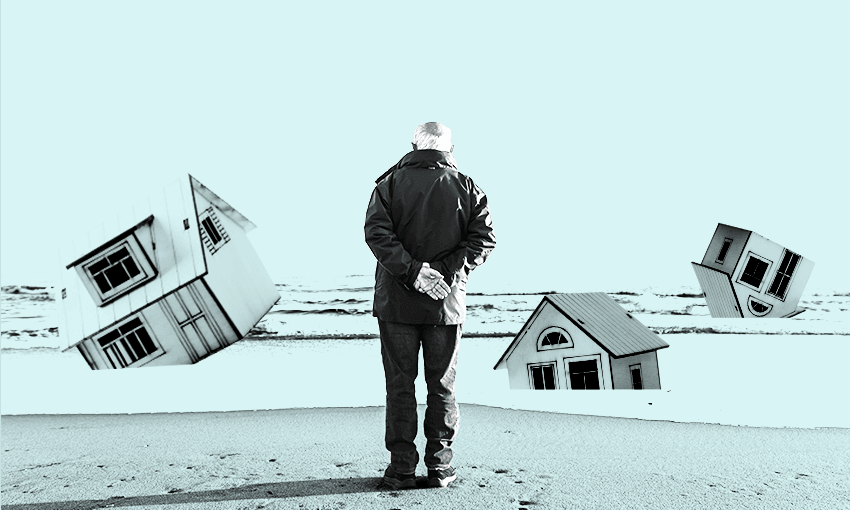The housing crisis is hitting senior renters especially hard, and their numbers are set to double in 25 years. Rachel Judkins explores this unsettling trend.
When retired nurse Jenny* bought her first house with her husband in 1986, it felt like she was starting down a road of financial security and stability. She took time off work to raise a family as most mothers did back then, and while thoughts of retirement were far off, she assumed she had it covered. But life had other ideas.
After a divorce, ongoing health problems and an earlier-than-planned retirement, she has found herself flatting at age 67 on the outskirts of Katikati, watching as her modest savings (that she relies on to supplement her pension) dwindle away. She has moved four times in the last twelve years and can’t afford the airfare to visit her grandchildren in Australia, but she feels lucky to be living in a warm, dry rental. For now.
It’s easy to assume most seniors own their own homes, but Jenny is one of a growing number of retired renters whose living arrangements are precarious at best, either due to minimum-wage jobs that never afforded home ownership in the first place, or losing a house after life crises like business failures, the death of a partner or the GFC. According to the Retirement Commission, 20% of over 65s pay rent, and this increases to 35% of Māori and 46% of Pasifika. Many live in unsuitable housing, struggle to pay increasingly high rents, and find themselves moving constantly.
While the ongoing housing crisis affects all who rent, our older population are even more vulnerable. Many who should be living out their golden years in peace and comfort find themselves stressed and isolated from the lack of stability.
Retirement commissioner Jane Wrightson points out that, contrary to popular belief, retirement can be anything but plain sailing. “There’s a kind of myth that talks about these fat-cat Boomers living on the hog and doing European river cruises, but that’s a relatively small proportion,” she says. Forty percent of seniors are living on the pension alone, and another 20% only have a little more from savings or income, so more than half of the 65+ cohort are financially fragile.
With home ownership increasingly out of reach of people on the median wage or lower, this problem will only get worse. Based on current trends, there will be a 100% increase in people over 65 renting in the next 25 years, meaning a whopping 600,000 seniors will find themselves living at the mercy of landlords and market rent.
Two years ago, Jenny was living alone in a well-maintained rental property in Katikati when her landlord decided to sell up. Disappointed to be leaving her friendly neighbours, she soon found there were very few properties available to rent in town, and no affordable bedsits or one-bedroom homes. Because of her arthritis, Jenny needed a place without steps, limiting her options further. The two rentals that fit the bill both cost over $500 per week, despite being barely inhabitable. “They were really old, really grotty inside and didn’t look like they were insulated,” Jenny says. “Just places that I wouldn’t like to live in.” She started to worry she wouldn’t find a suitable house in time.
Generally older people need smaller, single-level and low-maintenance housing, of which there is a shortage: only 5% of rental housing in New Zealand is accessible. It’s imperative that those with ailing health live in homes that are mould-free, safe from falls and located near medical services, and preferably family support.
Ageism can be a barrier to securing a lease. With demand for housing far outstripping supply, landlords can be picky about who they rent to, and while discrimination is illegal, it is difficult to prove and punish. Some landlords may welcome a quiet older tenant, but they are incentivised to keep up with market rent, so many prefer young professional couples who can afford rent increases rather than pensioners on fixed incomes.
Jenny endured six stressful weeks of searching, so was thrilled when a house 3km out of town came up for grabs. It was a new build, therefore warm and dry, but the rent was hundreds more per week than she was used to paying. With no other options, she signed the lease and her son flew over from Australia to help her move.The relief at having a roof over her head was soon overshadowed by the financial burden of living costs well beyond her means, and she immediately started looking for a flatmate.
New Zealand Superannuation was designed on the assumption that retired people would either be living in mortgage-free homes or paying below market rent for social housing. For 1 in 5 retirees, that assumption does not align with reality. For many, the pension is barely enough to cover accommodation, let alone food and bills during a cost-of-living crisis.
David Marshall, deputy president of Grey Power New Zealand, sees older people scrimping where they can to make their weekly rent. “We know of people who sit up in bed to read with the electric blanket on, because they can’t heat their lounge,” he says. “That’s how they compromise.” More and more older people are relying on food banks, he adds, because it’s the only way to stretch their income. And that’s just for the basics, not the small treats that make life enjoyable, like a coffee at a cafe or gym membership to stay fit.
Every fortnight, Jenny receives $800 Super (which includes extra for medical and an accommodation supplement, minus deductions for dental repayments), but with rent draining $300 per week, there is very little left for food, bills and ongoing medical expenses. In the several months it took Jenny to find a flatmate, she had to cover the full $550 per week rent all by herself. “It was really hard yakka,” she says. “I had to dip into my savings all the time and I didn’t think I would ever recover from that. I was starting to panic about what I would do when I finally ran out of money.”
Eventually another single woman answered Jenny’s prayers and Trade Me ad, was deemed suitable flatmate material and moved in. Jenny was immediately thankful for the financial reprieve, and after some initial adjustment, was also grateful for the company.
For those struggling to pay their rent each week or find suitable accommodation, there are very few options. Retirement villages require capital and don’t cater to renters, many local councils have sold their pensioner housing, and social housing generally has long waitlists and can be difficult to secure. Wrightson, the retirement commissioner, talks about those who find themselves with nowhere to live. “It’s largely a hidden problem, but homelessness in older people can take many forms,” she says. “It ranges from the people you see on the street, through to people who are couch surfing around friends and relatives, to those who have managed to get a mobile home.”
Reliance on whanau is not always an option, and for those who can count on family assistance, it can be a source of shame or put them at risk of elder abuse.
Unlike places like Germany, where renters can expect to spend large chunks of their life in the same home, long-term tenancies are one of the key gaps in the market here. Instead, renters in New Zealand move once a year on average, which is expensive and stressful. It can also have a negative impact on their wellbeing; an intangible yet critical part of the problem. Social cohesion and a sense of belonging comes from being able to put down roots, and loneliness and isolation are especially worrisome for those no longer in the workforce.
Although the latest move was stressful for Jenny, she now feels entrenched in her local community, keeping busy with regular lunch dates, games of mahjong and volunteering at the op shop in town. She loves her home and flatmate, and isn’t one to complain. “I’m happy with what I do have,” she says. “I don’t feel like I absolutely essentially need anything else. I’m rich in other ways. I have my children and that’s really all that matters.”
Jenny believes her current lease will be a long one, and sincerely hopes she dies in this house. She knows, though, that she will always be at the mercy of her landlord, so takes one day at a time. “I hope that I don’t have to move,” she says. “I hope that my rent doesn’t go up. And I don’t even want to think about what I’ll do when I run out of money. It’s just a frightening thought.”
Watch The Spinoff’s short documentary Last Home Renters about Rodney Patea, a retiree in Matarangi struggling to find a rental he can afford.



